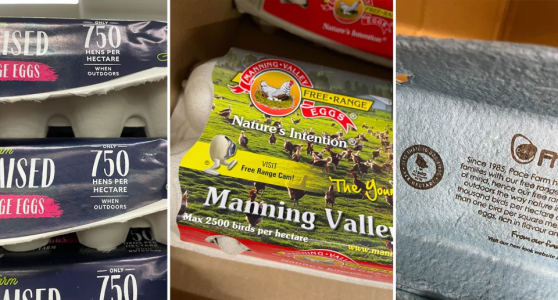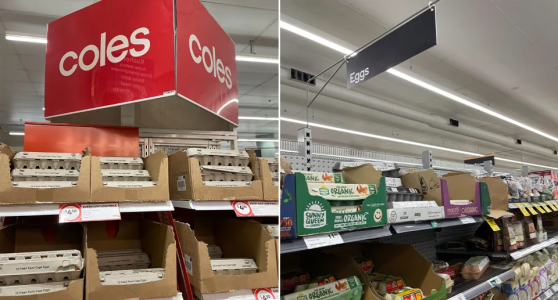Eggcellent Discoveries: Delving into the Hidden Numbers on Supermarket Eggs
As food lovers who love the warm, comforting embrace of a home-cooked meal, we often tend to ponder the origins of the ingredients that end up on our plates. Lately, we've noticed a major shift when it comes down to one important breakfast staple: eggs. Specifically, the rise of free-range eggs in search of a more ethical option. But did you know that it's not enough to simply choose 'Free-Range' at the supermarket? Let's dive into this hot topic and see why not all that glitter is gold.

The egg-scape of the conventional supermarket is changing, making room for a new breed of free-range eggs. As you walk down the aisle, you might have noticed that the difference in price between cage and free-range eggs has shrunk. Thousands of Aussies like us are now making ethical choices at the checkout, but there's more to the story than meets the eye.
While choosing free-range is a step in the right direction, to truly make an impact, we need to look closer at the carton. Egg farmers must disclose a number on their packaging, called the 'stocking density'. This number represents how many hens are allowed per hectare of outdoor space. This information is crucial, as not all free-range eggs are the same.
A trip to Bondi Junction revealed that the stocking density varied significantly in Woolworths and Coles, from 750 hens to a whopping 10,000 hens per hectare. Hens living in conditions with the maximum allowed density have only one square metre of space each.

Coles and Woolworths branded eggs have a maximum stocking density of 10,000 per hectare, which is a far cry from the CSIRO's recommendation of a mere 1500. Although the supermarkets display the stocking density prominently on cartons, it's not enough to make an informed decision - especially with the numbers often falling short of recommendations.
One savvy Woolworths shopper revealed her newly acquired wisdom. In a Facebook group, she wrote: 'We all need to take responsibility to ensure the animals we take from to live our lives; live the best lives to feed us eggs or meat; before their demise at our hands.'
In line with these efforts, major supermarket chains Coles and Woolworths have committed to phasing out caged eggs from their stores. By 2025, both companies aim to offer free-range or barn-laid eggs in their Western Australian and Victorian stores, with plans to expand to other locations.
This move reflects a broader objective of promoting ethical consumer choices and protecting animal welfare. The ACCC has further announced its own plans to eliminate cage eggs from the market by 2036. Overall, the ACCC's enforcement of standards, combined with the commitment of supermarkets, aims to provide transparency, improve chicken welfare, and empower consumers to make informed purchasing decisions.
 Armed with this knowledge, let's make our grocery shopping more ethical than ever before. Keep a sharp eye on the stocking density of the free-range eggs and pursue the most humane options you can find.
Armed with this knowledge, let's make our grocery shopping more ethical than ever before. Keep a sharp eye on the stocking density of the free-range eggs and pursue the most humane options you can find.

According to regulations, free-range egg cartons should prominently display stocking densities. This requirement ensures transparency for consumers. Source: Yahoo
The egg-scape of the conventional supermarket is changing, making room for a new breed of free-range eggs. As you walk down the aisle, you might have noticed that the difference in price between cage and free-range eggs has shrunk. Thousands of Aussies like us are now making ethical choices at the checkout, but there's more to the story than meets the eye.
While choosing free-range is a step in the right direction, to truly make an impact, we need to look closer at the carton. Egg farmers must disclose a number on their packaging, called the 'stocking density'. This number represents how many hens are allowed per hectare of outdoor space. This information is crucial, as not all free-range eggs are the same.
A trip to Bondi Junction revealed that the stocking density varied significantly in Woolworths and Coles, from 750 hens to a whopping 10,000 hens per hectare. Hens living in conditions with the maximum allowed density have only one square metre of space each.

Coles and Woolworths have made a significant commitment to animal welfare by announcing their plans to eliminate the sale of caged eggs by 2025. Source: Yahoo
Coles and Woolworths branded eggs have a maximum stocking density of 10,000 per hectare, which is a far cry from the CSIRO's recommendation of a mere 1500. Although the supermarkets display the stocking density prominently on cartons, it's not enough to make an informed decision - especially with the numbers often falling short of recommendations.
One savvy Woolworths shopper revealed her newly acquired wisdom. In a Facebook group, she wrote: 'We all need to take responsibility to ensure the animals we take from to live our lives; live the best lives to feed us eggs or meat; before their demise at our hands.'
The Role of the ACCC in Regulating the Egg Industry
The Australian Competition and Consumer Commission (ACCC) plays a crucial role in regulating and enforcing standards in the Australian egg industry. The ACCC ensures that egg producers adhere to various requirements, such as prominently stating stocking density on packaging and providing outdoor access for chickens. They also regulate the labelling of eggs to prevent deceptive practices, ensuring that all free-range eggs meet specific standards that prioritise the welfare of hens.In line with these efforts, major supermarket chains Coles and Woolworths have committed to phasing out caged eggs from their stores. By 2025, both companies aim to offer free-range or barn-laid eggs in their Western Australian and Victorian stores, with plans to expand to other locations.
This move reflects a broader objective of promoting ethical consumer choices and protecting animal welfare. The ACCC has further announced its own plans to eliminate cage eggs from the market by 2036. Overall, the ACCC's enforcement of standards, combined with the commitment of supermarkets, aims to provide transparency, improve chicken welfare, and empower consumers to make informed purchasing decisions.
Key Takeaways
- Not all free-range eggs are the same, and consumers should check the stocking density on the packaging.
- Stocking density refers to the number of hens per hectare; the lower the number, the more space the hens have.
- The Australian Competition and Consumer Commission enforces several standards for free-range eggs, including prominently stating the stocking density on the packaging.
- Both Coles and Woolworths have promised to phase out cage eggs by 2025.







